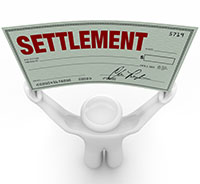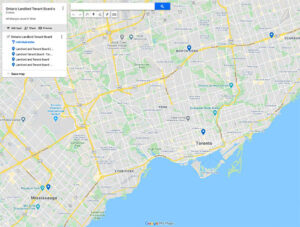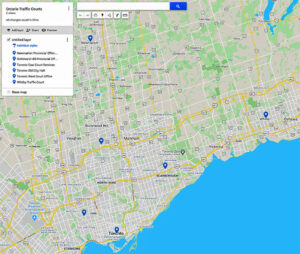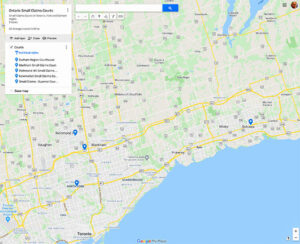Landlord and Tenant
Are You a Landlord?
 As a residential landlord, there are a multitude of reasons you may need to notify your tenant and/or commence a legal proceeding by filing an application with the Landlord and Tenant Board (LTB). Some of these reasons are:
As a residential landlord, there are a multitude of reasons you may need to notify your tenant and/or commence a legal proceeding by filing an application with the Landlord and Tenant Board (LTB). Some of these reasons are:
NOTICES TO TENANTS
- The tenant is not paying rent in full and/or on time
- The tenant is interfering with others, causing damage, or overcrowding the rental unit
- The tenant is engaging in or permitting illegal acts to occur in the rental unit
- You need to enter the rental unit for the purpose of repairs and maintenance
- You are increasing the rent
- You are selling the rental unit
- You or a family member intend to move into the rental unit for a minimum period of one (1) year
- You wish to demolish, repair, or convert the rental unit to another use
APPLICATIONS TO THE LANDLORD TENANT BOARD
Where applicable, notices are followed up by applications to the LTB for a hearing date. On the hearing date, with mutual agreement between yourself and your tenant, mediation services are available from the LTB to resolve the issue without proceeding to a formal hearing. Where efforts at mediation fail to resolve the issue, the formal hearing then proceeds (time-permitting), or is rescheduled to a future date.
EVICTIONS & LANDLORD RIGHTS
Evictions are referred to by the LTB as “ending the tenancy.” There are no short cuts to eviction. Your landlord rights, responsibilities, and the processes for enforcement of your rights are set out in the Residential Tenancies Act, 2006, and in Regulations of the Residential Tenancies Act.
Are You a Tenant?
 As a tenant, there are a multitude of reasons you may need to notify your landlord and/or commence a legal proceeding by filing an application with the Landlord and Tenant Board (LTB). Some of these reasons are:
As a tenant, there are a multitude of reasons you may need to notify your landlord and/or commence a legal proceeding by filing an application with the Landlord and Tenant Board (LTB). Some of these reasons are:
NOTICES TO LANDLORDS
- You paid rent above the guideline and need to file for a rebate
- You need the LTB to determine whether the landlord:
- entered the rental unit illegally
- changed the locks without providing replacement keys
- interfered with your reasonable enjoyment of the rental unit
- withheld or interfered with vital services
- harassed, interfered, obstructed, coerced or threatened you
- The landlord, in bad faith, served you with a notice to end your tenancy for personal or family member use; or for sale to a purchaser
- The landlord, in bad faith, served you with a notice to end your tenancy to demolish or repair the rental unit, or convert it to another use
- The landlord is failing to meet its health and safety, and maintenance obligations
APPLICATIONS TO THE LANDLORD TENANT BOARD
Where applicable, notices are followed up by applications to the LTB for a hearing date. On the hearing date, with mutual agreement between yourself and your landlord, mediation services are available from the LTB to resolve the issue without proceeding to a formal hearing. Where efforts at mediation fail to resolve the issue, the formal hearing then proceeds (time-permitting), or is rescheduled to a future date.
EVICTIONS & TENANT RIGHTS
Evictions are referred to by the LTB as “ending the tenancy.” There are no short cuts to eviction. Your tenant rights, responsibilities, and the processes for enforcement of your rights are set out in the Residential Tenancies Act, 2006, and in Regulations of the Residential Tenancies Act.
Landlord Tenant Board Offices
Toll Free 888-332-3234 or Toronto Area 416-645-8080
Landlord and Tenant Board website: http://www.sjto.gov.on.ca/ltb/
| Offices | Address |
| Toronto East Office | 2275 Midland Ave., Unit 2, Toronto, ON, M1P 3E7 |
| Toronto North Office | 47 Sheppard Avenue East, Suite 700, Toronto, ON, M2N 5X5 |
| Toronto South Office | 15 Grosvenor Street, 1st Floor, Toronto, ON, M7A 2G6 |
| Mississauga - Central Office | 3 Robert Speck Parkway, Suite 520, Mississauga, ON, L4Z 2G5 |
Traffic Tickets
Have a traffic ticket?
 If you have a traffic ticket, W. J. Burgess Legal Services (WJBLS) can fight your ticket from start to finish including:
If you have a traffic ticket, W. J. Burgess Legal Services (WJBLS) can fight your ticket from start to finish including:
- Filing your ticket with the court of jurisdiction
- Attending as many court dates as may be required to resolve the matter
- Obtaining disclosure on your behalf
- Reviewing the disclosure with you and discussing your options for next steps
- Preparing for trial, where required
Why fight a traffic ticket?
The legislation governing traffic offences in Ontario is the Highway Traffic Act, R.S.O. 1990, c. H.8 and its associated Ontario Regulations (commonly referred to as O. Regs.)
Driver’s Licence Record, Insurance Rates, and Demerit Points
A plea of guilty or a finding of guilt (“a conviction”) for traffic tickets you receive will be recorded on your driver’s licence by the Ministry of Transportation and will often increase your motor vehicle insurance rates, in addition to the fines you will have to pay for such convictions.
In many cases, it is in your best interest to fight your traffic tickets to have the ticket withdrawn or the charge, fines and/or demerit points reduced to save you money, keep insurance rates lower, and save demerit points.
Reg. 339/94 regulates the demerit point system in Ontario.Depending on the type of driver’s licence you have (full licence, new driver e.g. G1, G2) the number of demerit points you have can subject you to a possible driver’s licence suspension.
Some of the most common Highway Traffic Act offences that carry demerit points are:
| HTA Offence Description* | Demerit Points |
| Failing to obey signs | 2 |
| Driver failing to wear seat belt | 2 |
| Driving while holding or using handheld device | 3 |
| Exceeding the speed limit by 16 to 29 km/hour | 3 |
| Exceeding the speed limit by 30 to 49 km/hour | 4 |
| Following too closely | 4 |
| Failing to stop at an unprotected railway crossing (bus drivers only) | 5 |
| Exceeding speed limit by 50 km/h or more (stunt or racing) | 6 |
| Careless driving | 6 |
| Failing to remain at the scene of an accident | 7 |
| Driver failing to stop when signalled or requested to stop by a police officer | 7 |
*This listing is for illustrative informational purposes only and does not represent an exhaustive listing of all HTA offences that carry demerit points.
More information on demerit points and penalties for demerit points can be found at: https://www.ontario.ca/page/understanding-demerit-points
Why use a paralegal to represent me in court when I can do it myself?
Well, as one of my colleagues and mentors said, “You can cut your own hair too, but do you?” Maybe you do. Another way of looking at it is, you can change the oil in your car, but typically you take your car to someone who is a licensed professional with more experience than you have.
Attending court dates can be difficult to navigate and consume your valuable time, including having to take time off work to attend court. Additionally, the provincial offence courts are extremely busy and desire as much efficiency as possible in their proceedings. Typically, these courts permit cases where a legal representative has been retained to be heard first. Then they hear the cases from members of the public who are self-represented. Although this may seem inequitable, the courts recognize that representatives are paid by their clients to be in court. The court respects that your money is valuable and do not want you to have to pay for a representative to sit in court longer than necessary for your case to be heard.
Traffic Court Locations
| Court Name/link | Address | Phone |
| Newmarket Court | 465 Davis Drive, Suite 200, Newmarket, ON, L3Y 7T9 | 905-898-0425 |
| Richmond Hill Court | 50 High Tech Road, 1st floor, Richmond, ON, L4B 4N7 | 905-762-2105 |
| Toronto East Court | 1530 Markham Road, Main Floor, Scarborough, ON, M1B 3M4 | 416-338-7320 |
| Toronto South Court | Old City Hall, 60 Queen Street West, Toronto, ON | 416-338-7320 |
| Toronto West Court | York Civic Centre, 2700 Eglinton Avenue West, Toronto, M6M 1V1 | 416-338-7320 |
| Whitby (Durham) Court | 605 Rossland Road East, Lower Level, Whitby, ON, L1N 0B3 | 905-668-3130 |
Small Claims Court
Are you suing a person or business for money or property valued at $35,000 or less?
When you sue someone or a business in Small Claims Court, you are the Plaintiff. The person or business you are suing is the Defendant.
Before deciding to file a lawsuit (commonly referred to as a “claim”) in Small Claims Court, you need to seriously and factually consider the merits of your claim; the value of your time and money (including the cost of choosing to have representation); and the likelihood the defendant will be able to pay if you are successful.
Because of its inherent complexities and unknown contingent next steps, such legal services are typically billed on an hourly basis. And here’s why.
Broadly, there are five (5) distinct phases to a Small Claims Court claim.
If you are suing someone:
- The first phase as plaintiff:
- File a Statement of Claim against the defendant with the Small Claims court of jurisdiction within two (2) years of when you first learned about the issue (or ought to have known about the issue);
- Serve a copy of the Statement of Claim on the Defendant within six (6) months of filing the claim with the court;
- Complete an Affidavit of Service, which must then be commissioned by a paralegal or lawyer; and
- Submit the claim and the Affidavit of Service with the Small Claims Court where you filed the Statement of Claim.
- The second phase is two-pronged:
 If the Defendant does not file a defence within the stipulated timeframe, you can then file for a Default Judgement. This means first asking the Court Clerk to note the ‘defendant in default’ followed by filing a request for a Default Judgement from the court to order the Defendant to pay you the money you are owed without the participation of the defendant. This step may or may not involve filing a Notice of Motion and Supporting Affidavit or filing a Request to Clerk form to ask for an assessment hearing; OR
If the Defendant does not file a defence within the stipulated timeframe, you can then file for a Default Judgement. This means first asking the Court Clerk to note the ‘defendant in default’ followed by filing a request for a Default Judgement from the court to order the Defendant to pay you the money you are owed without the participation of the defendant. This step may or may not involve filing a Notice of Motion and Supporting Affidavit or filing a Request to Clerk form to ask for an assessment hearing; OR- If the Defendant files a defence within the stipulated timeframe, you will be served by the defence with a copy.
- The third phase:
- Where the Defendant has filed a defence, the court will send you a notice for a mandatory Settlement Conference. This step takes place between yourself and the Defendant in front of a judge. It gives you and the Defendant the right to be “heard”. Each side presents its side of the case with a view to settling the matter without a trial.
- The fourth phase is a Trial. This step occurs only if and after you and the Defendant are unable to come to a settlement.

- The fifth phase is Collection. If you are successful, it doesn’t mean you will automatically be paid by the Defendant. In some cases, it will be necessary for you to pursue further legal steps to receive any money you are entitled to by court order at the Settlement Conference stage or the Trial stage, as the case may be.
Are you or your business being sued by someone for money or property valued at $35,000 or less?
When someone or a business is suing you in Small Claims Court, you are the Defendant. The person or business suing you is the Plaintiff.
When you are served with a Small Claims Court lawsuit (commonly referred to as a “Claim”), you need to seriously, factually, and expeditiously consider your defence of the claim; the merits of the claim; and the value of your time and money (including the cost of choosing to have representation) to defend it.
Because of its inherent complexities and unknown contingent next steps, such legal services are typically billed on an hourly basis. And here’s why.
Broadly, there are three (3) distinct phases to a small claims court defence.
If you are being sued by someone:
- The first phase:
- File a Defence with the court within twenty (20) days following your being served with a Statement of Claim from the Plaintiff. In some instances, you may also wish to file your own claim, commonly referred to as a “Counterclaim”;
- Serve the Plaintiff with a copy of the Defence;
 Complete an Affidavit of Service, which must then be commissioned by a paralegal or lawyer; and
Complete an Affidavit of Service, which must then be commissioned by a paralegal or lawyer; and- Submit the Defence and the Affidavit of Service to the Small Claims Court where you filed the Defence.
- The second phase:
- After you have filed your Defence, the court will send you a notice for a mandatory Settlement Conference. This step takes place between yourself and the Plaintiff in front of a judge. It gives you and the Plaintiff the right to be “heard.” Each side presents its side of the case with a view to settling the matter without a trial.

- The third phase is a Trial. This step occurs only if and after you and the Plaintiff are unable to come to a settlement.
More information on Small Claims court procedures can be found at:
Small Claims Court Locations
| Court Name | Address | Telephone |
| Toronto Small Claims Court | 47 Sheppard Ave. East, Toronto, ON, M2N 5N1 | 416-326-3592 |
| Newmarket Small Claims Court | 50 Eagle Street West, Newmarket, ON, L3Y 6B1 | 905-853-4809 |
| Durham Region | 150 Bond Street East, Oshawa, ON, L1G 0A2 | 905-743-2630 |
| Markham Small Claims Court | 8500 Leslie St., Suite 395, Markham, ON, L3T 7M8 | 905-731-2664 |
| Richmond Hill Small Claims Court | 855 Major Mackenzie Drive East, Richmond Hill, ON, L4B 4X7 | 905-731-2664 |
Durham Region includes: Ajax, Brock, Clarington, Oshawa, Pickering, Scugog, Uxbridge & Whitby
Other Legal Services
Notary Public and Commissioning of Documents
Fast and affordable. W. J. Burgess Legal Services can notarize your documents or commission your affidavits and administer other legal oaths.


Subcontracting
If you are a Paralegal or Lawyer and are looking to subcontract and/or collaborate on:
- Landlord and Tenant Board matters
- Traffic Ticket matters
- Small Claims Court matters; or
- Legal Research
W. J. Burgess Legal Services would be happy to assist you.


 Click for Detailed Map
Click for Detailed Map Click Map for Details
Click Map for Details Click for detailed map
Click for detailed map